
GLOBAL ECOLOGY AND BIOGEOGRAPHY
metrics 2024
Pioneering Research for a Sustainable Future
Introduction
GLOBAL ECOLOGY AND BIOGEOGRAPHY is an esteemed academic journal published by Wiley that focuses on the dynamic interplay between ecological and biogeographical processes across the globe. With a strong commitment to advancing our understanding of biodiversity, conservation, and global change, this journal has secured a prestigious Q1 ranking in several categories, including Ecology, Ecology, Evolution, Behavior and Systematics, and Global and Planetary Change, highlighting its significant influence in the field. Since its inception in 1998, the journal has consistently provided a platform for high-quality research, featuring original articles that address critical ecological questions and emerging biogeographical trends. Researchers aiming to publish impactful work will appreciate the journal's rigorous peer-review process and its accessibility to a global audience. With a commendable track record reflected in its Scopus rankings, this journal is an essential resource for anyone dedicated to the study of ecology and biogeography.
Metrics 2024
 2.74
2.74 6.30
6.30 7.70
7.70 184
184Metrics History
Rank 2024
Scopus
IF (Web Of Science)
JCI (Web Of Science)
Quartile History
Similar Journals
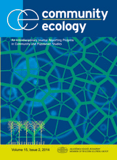
COMMUNITY ECOLOGY
Unraveling the Tapestry of Ecological NetworksCOMMUNITY ECOLOGY is a distinguished journal published by Springer Heidelberg that focuses on the intricate dynamics of ecological interactions within communities. Established in 2000 and continuing robustly through to 2024, this journal aims to disseminate significant research findings that contribute to the understanding of ecological processes, species interactions, and community structures. With an ISSN of 1585-8553 and an E-ISSN of 1588-2756, the journal holds a commendable position in the academic sphere, reflected in its Q2 quartile rankings in the categories of Ecology and Ecology, Evolution, Behavior and Systematics. It boasts an impressive Scopus ranking within the 57th percentile for both Agricultural and Biological Sciences and Environmental Science fields, attesting to its relevance and influence. Though it does not currently operate under an open access model, COMMUNITY ECOLOGY remains a vital resource for researchers, professionals, and students eager to advance their knowledge in community ecology, highlighting the importance of collaborative research in addressing ecological challenges globally.

ECOSYSTEMS
Exploring the intricate dynamics of ecosystems.ECOSYSTEMS, an esteemed journal published by SPRINGER, stands at the forefront of ecological research with a distinguished Q1 quartile ranking in multiple categories, including Ecology, Evolution, Behavior and Systematics, and Environmental Chemistry for 2023. Founded in 1998, the journal has become crucial for advancing our understanding of ecosystem dynamics and interactions, offering researchers a platform to disseminate significant findings relevant to ecological health and sustainability. Although Open Access is not available, the journal maintains a robust reputation, evidenced by its high Scopus rankings—placing it within the top 10% in diverse ecological domains. With a publication scope that spans fundamental and applied aspects of ecosystems, ECOSYSTEMS serves as an essential resource for professionals and students pursuing innovative ecological solutions, making it indispensable for contributing to the global conversation on environmental sustainability. For more information, please visit the publisher's site or access your institution's library resources.
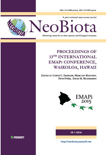
NeoBiota
Championing innovative research in ecology and conservation.NeoBiota, published by Pensoft Publishers in Bulgaria, is a preeminent Open Access journal dedicated to advancing knowledge in biodiversity, ecology, and conservation science. Since its inception in 2011, it has established itself as a pivotal platform for scholarly discourse, maintaining an impressive impact factor that places it in the Q1 quartile across multiple categories, including Animal Science and Zoology, Aquatic Science, and Ecology. With its articles indexed in leading databases and Scopus rankings that affirm its standing (e.g., rank #12 in Animal Science and Zoology), NeoBiota serves as a vital resource for researchers, professionals, and students. The journal emphasizes the synthesis of ecological modeling and evolutionary processes, fostering interdisciplinary collaboration and promoting rigorous research methodologies. Authors are encouraged to contribute their insights on biodiversity metrics, ecosystem dynamics, and the ecological implications of anthropogenic changes, making NeoBiota essential for anyone invested in the future of our planet's ecosystems. Discover the treasures of ecological scholarship through this influential journal.
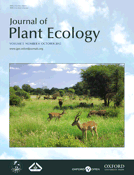
Journal of Plant Ecology
Fostering Collaboration for a Greener FutureJournal of Plant Ecology, published by Oxford University Press, is a premier journal dedicated to advancing the scientific understanding of plant ecology. With an ISSN of 1752-9921 and an E-ISSN of 1752-993X, this journal has established itself as a leading resource in the field, maintaining a prestigious Q1 ranking across multiple categories in the 2023 Scopus rankings, including Ecology, Evolution, Behavior and Systematics and Plant Science. The journal's commitment to high-quality research is underscored by its influence in agricultural and biological sciences, reflected in its competitive percentiles. While currently not offering open access, its comprehensive scope spans various ecological issues critical to understanding plant interactions and ecosystems, making it an essential read for researchers, educators, and students alike. The Journal of Plant Ecology not only facilitates the dissemination of vital findings but also fosters collaboration within the global scientific community. Discover more about the latest innovative research and key developments in plant ecology, and contribute to the dialogue that shapes our understanding of environmental stewardship and biodiversity conservation.

FOLIA GEOBOTANICA
Innovating insights into ecological and evolutionary patterns.FOLIA GEOBOTANICA, published by Springer, is a distinguished journal dedicated to advancing the fields of Paleontology and Plant Science through the dissemination of high-quality research. With an ISSN of 1211-9520 and an E-ISSN of 1874-9348, this journal has been pivotal in providing a platform for innovative studies from 1994 to 2024. Notably, FOLIA GEOBOTANICA holds a Q3 ranking in Paleontology and a Q2 ranking in Plant Science as of 2023, affirming its relevance and contribution to the scholarly community. The journal is located in the Netherlands at VAN GODEWIJCKSTRAAT 30, 3311 GZ DORDRECHT, and is not an Open Access publication, ensuring comprehensive review processes and scholarly integrity. With Scopus rankings that place it in the 50th percentile for Plant Science and 46th for Paleontology, FOLIA GEOBOTANICA continues to attract researchers, professionals, and students who are keen to explore the intricacies of plant ecology and fossil records, thereby fostering a deeper understanding of ecological and evolutionary patterns.

ECOLOGICAL RESEARCH
Connecting researchers to shape the future of ecological science.ECOLOGICAL RESEARCH is a prestigious academic journal published by WILEY, dedicated to advancing the field of ecology and its associated disciplines. Since its inception in 1986, the journal has consistently provided a platform for high-quality, peer-reviewed research, contributing significantly to the understanding of ecological systems and their complexities. With an impressive 2023 impact factor reflected in its Q1 ranking in the category of Ecology, Evolution, Behavior, and Systematics, it stands among the top journals in its field, as evidenced by its Scopus rank of #192 out of 721 and placement in the 73rd percentile. While accessible through standard subscription models, this journal plays an essential role in disseminating crucial findings and innovative methodologies to researchers, professionals, and students alike. With a commitment to fostering ecological knowledge and collaboration, ECOLOGICAL RESEARCH continues to influence ecological practices and policies, shaping the future of research in this critical area.
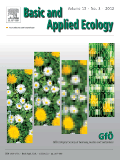
BASIC AND APPLIED ECOLOGY
Elevating the discourse in ecology, evolution, and behavior.BASIC AND APPLIED ECOLOGY, published by Elsevier GmbH in Germany, stands out as a premier journal in the field of ecology, evolution, behavior, and systematics. With its ISSN 1439-1791 and E-ISSN 1618-0089, the journal enjoys a distinguished reputation, evidenced by its classification in the Q1 category for Ecology in 2023 and impressively ranking #89 out of 721 in this domain according to Scopus. Since its inception in 2000, it has served as a vital platform for disseminating high-quality research that bridges theoretical insights and practical applications in ecology. Researchers, professionals, and students alike can look forward to the latest findings that not only foster a deeper understanding of ecological processes but also inform sustainable practices crucial for our environment. As the journal continues its journey through to 2024, it remains committed to advancing ecological knowledge and supporting innovative research in an ever-evolving field.
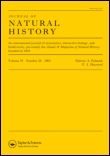
JOURNAL OF NATURAL HISTORY
Charting the Course of Ecosystem DynamicsThe Journal of Natural History, established in 1967, is a pivotal academic resource published by Taylor & Francis Ltd. With an ISSN of 0022-2933 and an E-ISSN of 1464-5262, this journal is a cornerstone in the field of Ecology, Evolution, Behavior, and Systematics. Ranked Q2 in its category as of 2023, it stands out with a Scopus ranking of #477 out of 721, reflecting its influence and relevance, particularly in the agricultural and biological sciences. The Journal of Natural History aims to disseminate high-quality, peer-reviewed research that contributes to our understanding of biodiversity and ecosystem dynamics. Although it does not operate under an open-access model, this journal remains accessible through various academic libraries and platforms, making it an essential resource for researchers, professionals, and students striving to advance their knowledge in natural history. With its long-standing commitment to excellence, the journal plays a crucial role in shaping discourse and fostering innovation in ecological research.
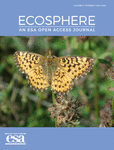
Ecosphere
Innovating research to illuminate ecological interactions.Ecosphere is a leading open-access journal published by WILEY, dedicated to advancing research in the fields of ecology, evolution, behavior, and systematics. Established in 2010 and headquartered in the United States, this innovative journal provides a platform for the exchange of cutting-edge scientific knowledge and discovery, fulfilling its mission to enhance our understanding of ecological systems and their interactions. With a prestigious impact factor reflecting its commitment to high-quality research, Ecosphere is ranked Q1 in both Ecology and Ecology, Evolution, Behavior, and Systematics for 2023, further solidifying its prominence in the scientific community. The journal's scope includes a wide array of topics related to environmental science, making it an essential resource for researchers, professionals, and students aiming to stay at the forefront of ecological research. It offers comprehensive open access options, ensuring that groundbreaking findings are readily available to a global audience, thus fostering collaboration and innovation in the field.

WEB ECOLOGY
Pioneering Research at the Intersection of Nature and TechnologyWEB ECOLOGY is a premier academic journal published by COPERNICUS GESELLSCHAFT MBH, specializing in the field of Ecology, with a specific emphasis on the intricate interrelations between web-based ecosystems and environmental factors. Since its inception in 2000, this Open Access journal has provided an invaluable platform for researchers, professionals, and students to disseminate and access cutting-edge research findings. Currently based in Germany, WEB ECOLOGY has garnered a significant reputation, evidenced by its prestigious Q2 quartile ranking in both Ecology and Ecology, Evolution, Behavior and Systematics as of 2023. Furthermore, its impressive Scopus rankings, placing it within the top quartiles of its categories, highlight its relevance and influence in the field. With comprehensive coverage from 2000 to 2024, the journal aims to foster dialogue and innovation in ecological research, making significant contributions to our understanding of web ecology and inviting submissions that push the boundaries of current knowledge.